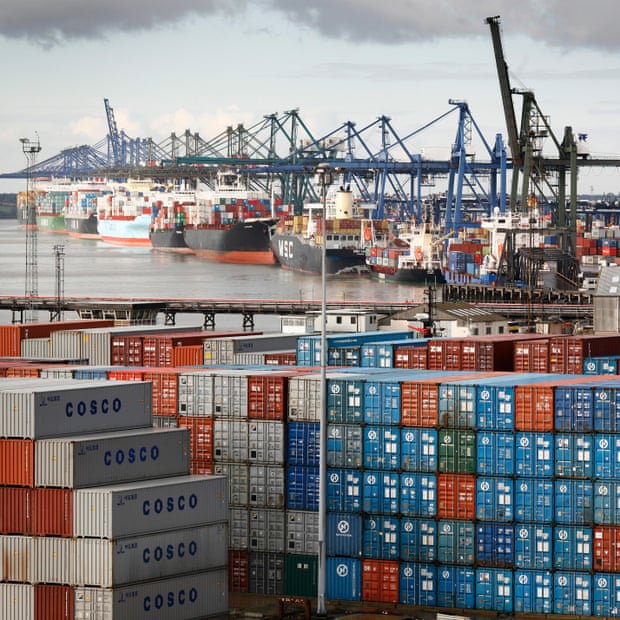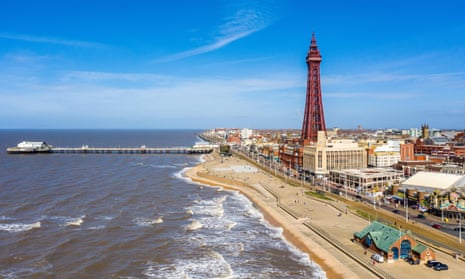The UK economy unexpectedly returned to growth in May, fuelled by a boom in holiday bookings and a large rise in GP appointments.
The Office for National Statistics said gross domestic product (GDP) rose by 0.5% on the month, after a revised 0.2% decline in April. City economists had expected zero growth amid fears over the impact from the cost of living crisis.
Despite the overall rise in activity on the month, the latest snapshot revealed a decline in consumer-facing services driven by falling retail sales and a slump in sports activities and recreation.
Industrial output rose 0.9% on the month, thanks to strength in the manufacturing sector, while the construction industry grew by 1.5%, helped by a rise in housebuilding activity and office refurbishment work.
The ONS said health was the biggest driver as more people saw GPs, offsetting the winding down of the coronavirus test and trace and vaccination schemes. It said road hauliers also had a busy month, while travel agents and tour operators benefited from a sharp rise in bookings amid pent-up demand for summer holidays.
GDP is the sum of all goods and services produced in the economy, including sectors such as health, education and government. The economic contribution of GP visits and other health services where there is no market price is estimated by statisticians by counting activity.
The figures come as airports struggle with booming demand for overseas travel as holidaymakers return to flying abroad after the easing of pandemic restrictions, with scenes of lengthy delays and cancellations across the country.
Analysts said the stronger monthly GDP figures could tempt the Bank of England to raise interest rates by 0.5 percentage points at the next meeting of its monetary policy committee in August, as the central bank responds to inflation reaching the highest levels since 1982.
Consumer-facing services fell by 0.1% on the month, with households hit by soaring living costs. However, this held up better than a decline of 0.8% in April, mainly because of an 11% monthly increase in holiday bookings.
Kitty Ussher, the chief economist at the Institute of Directors, said the latest figures were reassuring for business leaders. “While many people are undoubtedly feeling the pressure on household bills, the much-publicised weakening in retail sales is also partly offset by consumers switching back to spending on the separate category of tourism travel,” she said. “Overall, there’s nothing in this data that will prevent the Bank of England from continuing to raise interest rates when it meets over the summer.”
However, there are concerns that the cost of living crisis could force consumers to rein in their spending over the coming months amid a fresh rise in household energy bills.
Q&AWhat is gross domestic product (GDP)?
Show

Gross domestic product (GDP) measures the total value of activity in the economy over a given period of time.
Put simply, if GDP is up on the previous three months, the economy is growing; if it is down, it is contracting. Two or more consecutive quarters of contraction are considered to be a recession.
GDP is the sum of all goods and services produced in the economy, including the service sector, manufacturing, construction, energy, agriculture and government. Several key activities are not counted, such as unpaid work in the home.
The ONS uses three measures that should, in theory, add up to the same number.
• The value of all goods and services produced – known as the output or production measure.
• The value of the income generated from company profits and wages – known as the income measure.
• The value of goods and services purchased by households, government, business (in terms of investment in machinery and buildings) and from overseas – known as the expenditure measure.
Economists are concerned with the real rate of change of GDP, which accounts for how the economy is performing after inflation.
Britain's government statistics body, the Office for National Statistics, produces GDP figures on a monthly basis about six weeks after the end of the month. It compares the change in GDP month on month, as well as over a three-month period.
The ONS warns that changes on the month can prove volatile, preferring to assess economic performance over a three-month period as the wider period can smooth over irregularities.
The most closely watched GDP figures are for the four quarters of the year; for the three months to March, June, September and December.
The figures are usually revised in subsequent months as more data from businesses and the government becomes available.
The ONS also calculates the size of the UK economy relative to the number of people living here. GDP per capita shows whether we are actually getting richer or poorer, by stripping out the impact of population changes.
Richard Partington
Economists also expect a sharp drop in activity in June because of the effects of the extra bank holiday for the Queen’s platinum jubilee, which is likely to result in a decline in second-quarter GDP. If the economy shrinks again in the third quarter, that would meet the technical definition of a recession.
Paul Dales, the chief UK economist at the consultancy Capital Economics, said: “With real household disposable incomes set to fall further in the third quarter, a recession is still a real risk. That may mean the economy proves to be a poisoned chalice for whoever wins the race to be the next prime minister.”
Business leaders said the economy was still facing significant structural issues, including uncertainty about Brexit, continued Covid lockdowns in China and supply chain problems, as well as soaring energy costs.
Rachel Reeves, the shadow chancellor, said living standards had fallen and real wages were failing to rise. “Instead of presenting the plans we need for a stronger, more secure economy, the Tories are spending every waking minute indulging in unfunded fantasy economics,” she said.
Nadhim Zahawi, the chancellor and one of the contenders to succeed Boris Johnson as Tory leader, said: “It’s always great to see the economy growing but I’m not complacent. I know people are concerned, so we are continuing to support families and economic growth.”
